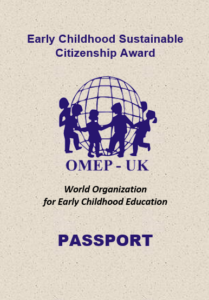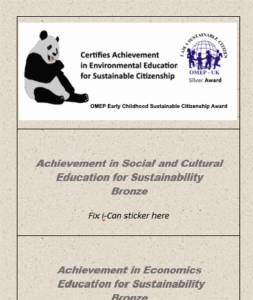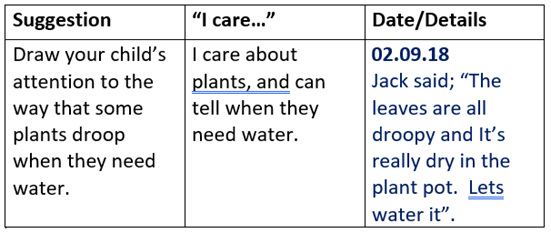We would love your early childhood setting to participate. If you are interested in participating please contact us at OMEP-UK via email. You can also download our flyer here.
Sustainable Citizenship
Since the 2005 United Nations World Summit, it has become commonplace to refer to the “interdependent and mutually reinforcing pillars” of sustainable development as social and cultural sustainability, economic sustainability, and environmental sustainability. The challenge for early childhood educators has been to develop appropriate educational systems, curriculum and pedagogic practices that provide an appropriate early introduction to each of these areas of concern, and genuine experience of applying them together in sustainable practice. It is important to understand that these three pillars are mutually dependent and must act together, and that any practices and policies developed without taking each into account are likely to fail.

From the perspective of sustainable development, the most efficient or effective environmental, economic or social strategy may not be the most sustainable. Interdisciplinary decision making is crucial. Many authorities see good governance as another vital component that should be considered an additional ‘pillar’ for sustainable development. From an early childhood education perspective, these democratic concerns may be realised through the encouragement of more participation by the local community, by families and especially by the children themselves, in co-constructing the sustainability curriculum. It is for this reason, and in recognition of the UN Convention on the Rights of the Child which suggests that all children should have a voice in all matters that effect their lives, that we refer throughout these pages to Education for Sustainable Citizenship.
Sustainable Citizenship Award
The OMEP UK Early Childhood Education for Sustainable Citizenship Award is an initiative that was developed following work reviewing provisions for Early Childhood Education for Sustainable Development (ESD) applying the OMEP Environmental Rating Scale for Sustainable Development in Early Childhood (ERS-SDEC). This work was carried out by OMEP in ten countries: Chile, China, Kenya, Korea, Norway, Portugal, Sweden, Turkey, the UK, and the USA between 2010 and 2014. This work was published in 2016 and further details (including copies of the research instrument) are available for download HERE. The rating scale has been operationalised for the award scheme as a progressive series of self audit tools. The criteria applied audit and accreditation at the Bronze level are summarised HERE.

The OMEP Early Childhood Sustainable Citizenship Award has been developed to support a wide range of early childhood providers including childminders, preschools, and nurseries who are working with parents in supporting the objectives of Education for sustainable development in early childhood.
The scheme is organised around an ‘ESC Passport’ that is provided for each child. This document summarises the provisions of the United Nations Convention on the Rights of the Child (1989), and defines Sustainable citizenship as a life-long emergent capability.
The passport also provides discounted entry to wildlife conservation parks and other related community resources and services. (Note: Currently Suspended due to Pandemic)
Each child is able to collect up to 15 award stickers for entry into their passport, and these show their ESC achievements at Bronze, Silver and Gold level. To be awarded each sticker, parents and preschool practitioners work together to support the child in completing educational activities that range from the identification and naming of three wild birds, the identification of wildlife habitats, to the recycling of waste materials, and the recognition of cultural and linguistic diversity.
The approach celebrates sustainable achievements and innovations, and encourages the children to feel themselves involved in the creation of a more sustainable future.

The activities are set at an appropriate level for the age group, they are based upon commonly available environmental resources, and provide the foundations of an education for sustainable citizenship that addresses all aspects of the United Nations Sustainable Development Goals.
Participating preschool settings are provided with a range of resources that offer an optimistic, and pro-active approach to the subject that celebrates sustainable achievements and innovations and encourages the children to feel themselves involved in the creation of a more sustainable future.
There are fifteen ‘I-care…’ booklets in the complete set. These comprise Bronze, Silver and Gold awards in the following ESC educational areas that broadly address the UN Sustainable Development Goals:
- Social-Cultural education
- Economics education
- Environmental education
- Emergent Literacy education
- Emergent Numeracy education
Each of the booklets also has recommendations for related picture story books or activities. Once the child has completed their ‘I-care…’ book, their key person, will issue a sticker for their ESC passport.

OMEP UK provides Training for ESC Award Trainers – email for further details
Useful Publications are available HERE.
Further information related OMEP’s work in this area may be found on the World OMEP website: HERE – and HERE